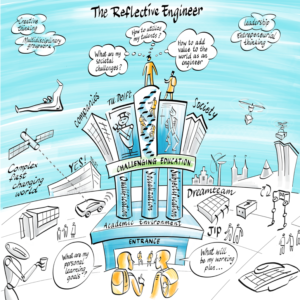Fundamentals of Biomedical Engineering (TUD)
The modern engineer is expected to have technical knowledge and transferable and interpersonal skills (also mentioned as professional skills). These skills include being able to work in teams, showing (self-)leadership, having good decision-making and communication skills, having the ability to plan and prioritize goals and tasks, and most importantly, reflect on and learn from your experiences (be aware of your development). We call this engineer, “the reflective engineer” and we aim to give our students the opportunity to think about who they want to become (as person and as engineer) prior to what they want to learn in line with societal context. It is important that students themselves think about their professional identity as early as possible (lifelong learning).
In this course, the students will become familiar with the field of biomedical engineering (BME) and learn the fundamentals of the different subdisciplines in this field.
Theoretical lectures are combined with a self-reflection assignment, in which the students explore their engineering role in relation to their future career in BME, and challenge-based assignment in which they will develop a solution to a challenging problem within BME together with their team.
Next to these assignments, three workshops will be given focused on role-play, peer review, and debating.
By the end of this course, the students should be able to:
1. Define the problems that need to be addressed in the health field, considering crucial societal aspects, and the roles biomedical engineers and stakeholders can play in solving these issues.
2. Apply physical and engineering terms and principles in building a strategy within the multidisciplinary context of biomedical engineering.
3. Outline the steps needed to be taken in order to validate or implement biomedical techniques, devices, and methods in the health system.
4. Analyse the impact and consequences of your work when intervening in the field of biomedical engineering.
5. Develop evaluative judgment on the quality of your own work and of the performance of others (including peers) by implementing and providing feedback.
6. Reflect on your own interests, role, and personal development in relation to your future professional self in the field of biomedical engineering.





